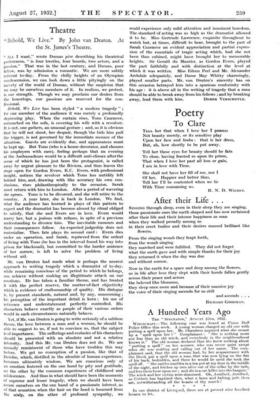Theatre
"Behold, We Live." By John van Druten. At the St. James's Theatre.
"ALL I want," wrote Dumas pire describing his theatrical preferences, " is four trestles, four boards, two actors, and a passion." That was in the last century, and Dumas, poor fellow, was by admission a romantic. We are more subtly
reticent to-day. From the chilly heights of an Olympian condescension, we can look down a little pityingly on, the naivety of the world of Dumas, without the suspicion that we may be ourselves members of it. In realism, we protest, is our strength. Though we may proclaim our desires from the housetops, our passions are reserved for the con- fessional.
Behold, We Live has been styled " a modern tragedy " ; for one member of the audience it was merely a profoundly depressing play. When the curtain rises, Tono Cazenove, entrenched on the sofa, is covering his wife with a revolver. It is not, one gathers, an unusual gesture ; and, as it is obvious that he will not shoot, her despair, though 'she bids him pull the trigger, is not governed by the immediate menace of the situation; -Guests are evidently due, and appearances must be kept up. But Tono (who is a house-decorator, and chooses his employers with care), feeling perhaps that an evening at the Ambassadeurs would be a difficult anti-climax after the scene of which he has just been the protagonist, is called away by urgent pleasure to the Riviera, and thus leaves the stage open for. Gordon Evers, K.C. Evers, with professional insight, notices the revolver which Tono has untidily left behind him, and, drawing with like accuracy his own con- clusions, rises philanthropically to the occasion. Sarah must return with him to London. After a period of wavering' she agrees. Tono is to be divorced, and she will retire to the country. A year later, she is back in London. We find, what the audience has learned in plays of this pattern to expect and the dramatist has become almost by ritual obliged to satisfy, that she and Evers are in love. Evers would marry her, but a jealous wife refuses, in spite of a previous understanding to divorce him. The inevitable rumours and their consequences follow. An expected judgeship does not materialize. Then fate plays its second card : Evers dies: under an operation, and Sarah, reprieved from the ordeal of living with Tono (he has in the interval found his way into prison for blackmail), but committed to the harder sentence of her sorrow, is left to solve the problem of living without aid.
Mr. van- Druten had made what is perhaps the nearest approach to writing tragedy which a dramatist of to-day, while remaining conscious of the period to which he belongs, can achieve without making an illegitimate attack on our emotions. He has taken a familiar theme, and has treated it with the perfect reserve, the matter-of-fact objectivity which is evidence of craftsmanship of quality. His dialogue is, by present standards, natural and, by any, unassuming ; his perception of the important detail is keen; his use of reticence and understatement perfectly controlled. His characters behave exactly as people of their various orders would in such circumstances naturally behave.
Yet, if Mr. van Druten is going to write seriously of a sublime theme, the love between a man and a woman, he should be able to suggest to us, if not to convince us, that the subject is of importance. The sufferings and ecstasies of his characters should be presented with an absolute and not a relative intensity. 'And this Mr. van Druten does not do. We are uneasily reminiscent of those who have trodden this way before. We get no conception of a passion, like that of Deirdre, which, distilled in the alembic of human experience, becomes ultimately wisdom. We are conscious only of an emotion fostered on the one hand by pity and gratitude, on the other by the common experiences of childhood and adolescence. And thus in what should have been the moments of supreme and lesser tragedy, when we should have been aware ourselves on the one hand of a passionate interest, as of that sensation when the hair on the head is loosened from the scalp, on the other of profound sympathy, we could experience only mild attention and imminent boredom. The standard of acting was as high as the dramatist allowed it to be. Miss Gertrude Lawrence, exquisite throughout to watch but, at times, difficult to hear, brought to the part of Sarah Cazenove an evident appreciation and partial expres- sion of the essentials of tragic acting which, had she not been thus cabined, might have brought her to memorable heights. Sir Gerald du Maurier, as Gordon Evers, played the part faithfully and with distinction at the level at which it was written. Miss Eileen Peel and Mr. Alexander Archdale adequately, and Dame May Whitty charmingly, played smaller parts. Mr. van Druten's sincerity has on this occasion betrayed him into a spurious conformity with his age : it is above all in the writing of tragedy that a man should be able to break away from his fellows ; and by breaking


























 Previous page
Previous page